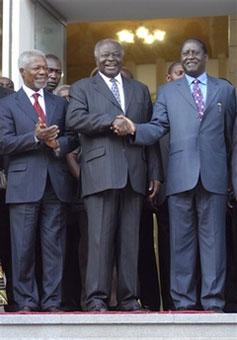
Opposition supporters stand by a burning vehicle set on fire in Kisumu, following the shooting of Kenyan opposition lawmaker David Too by a police officer in Eldoret. Photograph: AP
Xan Rice in Eldoret and Chris McGreal in NairobiThe first day of international efforts to negotiate an end to Kenya's bloody election crisis were thrown into disarray yesterday after a policeman shot dead an opposition member of parliament, the second MP to be killed this week, in what his party called a "political assassination".
The leader of the opposition Orange Democratic Movement, Raila Odinga, described the shooting of David Kimutai Too in the town of Eldoret as part of a political strategy to weaken his party's hold on parliament. "I condemn this second execution of an ODM member of parliament. The purpose of this killing is to reduce the ODM majority," he said.
The police said the killing was the result of a domestic dispute. Earlier this week, another opposition MP, Melitus Were, was shot dead outside his home in Nairobi. Yesterday, Salim Lone, the ODM spokesman, said the party was concerned about the safety of its MPs and was urgently reviewing security arrangements.
News of Too's death prompted more violence in the Rift Valley, including the burning of the homes of what are seen as rival ethnic groups to the Kalenjin majority there, while at least two people were killed by police shooting at the mobs.
The MP's killing also forced the postponement of a meeting between the government and opposition mediated by the former United Nations secretary general, Kofi Annan, and added to the urgency of a warning yesterday by his successor at the UN, Ban Ki-moon, that Kenya faces a looming "catastrophe".
Ban is expected to arrive in Nairobi today to give added international weight to the mediation efforts to end the violence that has already killed about 850 people since President Mwai Kibaki claimed victory in highly disputed circumstances in the December 27 election.
Odinga is demanding a new ballot. Kibaki has ruled it out. Annan has said the talks could take months, but Ban warned a meeting of the African Union in Ethiopia yesterday that the killing needs to be swiftly brought to an end. "Violence continues, threatening to escalate to catastrophic levels," he said. "I call on the Kenyan people: stop the killings and end the violence now before it's too late."
The AU's chairman, Alpha Oumar Konare, told 40 of the continent's leaders at the opening of the summit that they must take action. "If Kenya burns, there will be nothing for tomorrow," he said. "Kenya is a country that was a hope for the continent. Today, if you look at Kenya you see violence on the streets. We are even talking about ethnic cleansing. We are even talking about genocide. We cannot sit here with our hands folded."
Too was killed in Eldoret, an opposition stronghold in the Rift Valley that has seen some of the worst ethnic violence since the disputed election. Witnesses said he was with a female traffic constable. They were looking at land that Too was considering purchasing, according to Beatrice Chepkemboi, 23, speaking at the scene yesterday afternoon. When the pair arrived back at their car, a traffic officer on a police motorbike sped up to them.
"The MP had climbed into the car and the lady was about to open the door when the officer shot her," said Chepkemboi, who watched the scene from a house about 30 metres away. "She put up her hands in surrender and pleaded with the officer but he shot her again."
The officer went round to the driver's side of the car and shot Too several times, Chepkemboi said. Photographs taken on a mobile phone showed him slumped over the driver's window. The officer then sped away. He later gave himself up to police.
As soon as the news reached town, people began running back to their homes, fearing another outburst of violence. Shops were shuttered up as youths set up roadblocks in the streets and military helicopters flew overhead. In the Kapsoya Estate, where the officer comes from, at least one house was burned down.
In the late afternoon, several dozen people were still clustered around the murder scene. The police explanation that this was a "crime of romance" was flatly rejected by many in the town. Some residents said they believed the killing was political.
Kevin Juma, a 33-year-old mechanic, said: "Why are you even asking if it is political? We have lost two opposition MPs in three days. After this, there will never be peace if Kibaki does not go - that is not a plea, it's a promise."
At a glance
Dec 27 2007 Kenya's elections
Dec 30 Riots over Mwai Kibaki's disputed presidential victory.
Jan 1 2008 Thirty Kikuyus killed in church fire.
Jan 4 The UN says the unrest has uprooted 250,000 people.
Jan 7 John Kufuor, the African Union chairman and president of Ghana, arrives for fruitless mediation.
Jan 17 Police fire teargas and bullets on banned opposition rallies.
.Jan 24 Former UN secretary general Kofi Annan brokers meeting between Kibaki, below, and Odinga, far left.
Jan 28 At least 64 killed in four days of fighting.
Feb 1 UN secretary general Ban Ki-moon to arrive in Nairobi.
Friday February 1, 2008
The Guardian
 Luo tribe members enforced a makeshift roadblock as they searched vehicles yesterday for fleeing Kikuyus in Kisumu, Kenya. (Ben Curtis/associated press)
Luo tribe members enforced a makeshift roadblock as they searched vehicles yesterday for fleeing Kikuyus in Kisumu, Kenya. (Ben Curtis/associated press) 






























